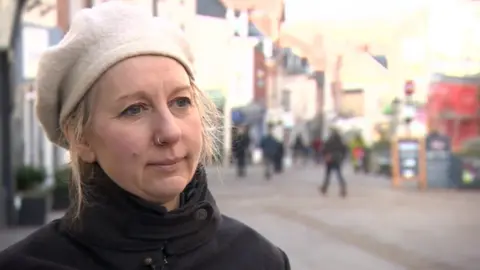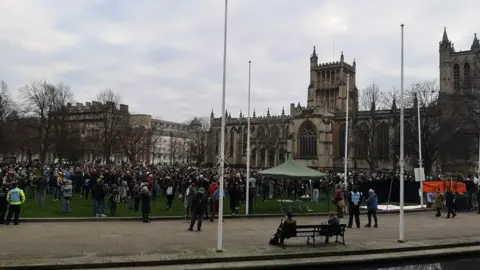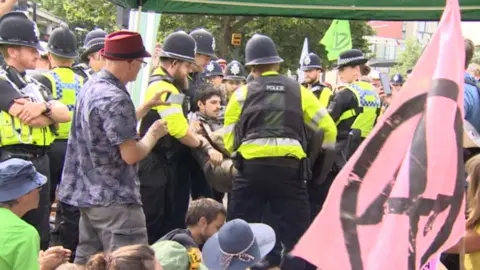Extinction Rebellion co-founder brands crime bill authoritarian
 BBC
BBCThe co-founder of Extinction Rebellion climate group has vowed to continue their fight against proposed "authoritarian" police powers.
Climate activist Dr Gail Bradbrook said the proposed police and crime bill could be harmful to democracy by seeking to stifle legitimate protest.
A number of the most controversial aspects of the proposals have been rejected by the House of Lords.
Dr Bradbrook said climate activists would maintain pressure on politicians.
'Life on Earth'
"A bill that's trying to control protest in such a strong way is authoritarian", Dr Bradbrook from Stroud said.
"It would have an impact on how effective our protests could be and it may put some people off joining, and I think that's what its designed to do.
"Ultimately though we're fighting for life on Earth and we're not going to stop no matter what gets put on this bill."
The Police, Crime, Sentencing and Courts Bill includes plans to give the police new powers to stop protests in England and Wales if they are deemed to be too noisy and disruptive.

Currently, if officers want to restrict a protest, they have to show it could result in "serious public disorder, serious damage to property or serious disruption to the life of the community".
They can also impose specific measures on the routes of marches.
However, the new proposals would tackle that.
The bill will now return to the Commons for MPs to have their say.
Acknowledging some of the protest methods used by Extinction Rebellion, such as blocking roads and businesses, Dr Bradbrook said: "There are consequences to the work we do and we're willing to face those consequences in the courts of law using the legislation that's already in place".

Stroud's Green Party town councillor, Sue Fenton, has also questioned the need for the bill.
"Why do they need these extra powers?" she said.
"It seems to be completely over the top, it seems to be just an attempt to crush dissent."
Dr Bradbrook said her campaign group would maintain pressure until major aspects of the bill were dropped.
"There are other aspects in the bill that seem right to us; it's not the whole bill, it's the piece on protest and on the rights of travellers and gypsies as well" they disagreed with, she said.
